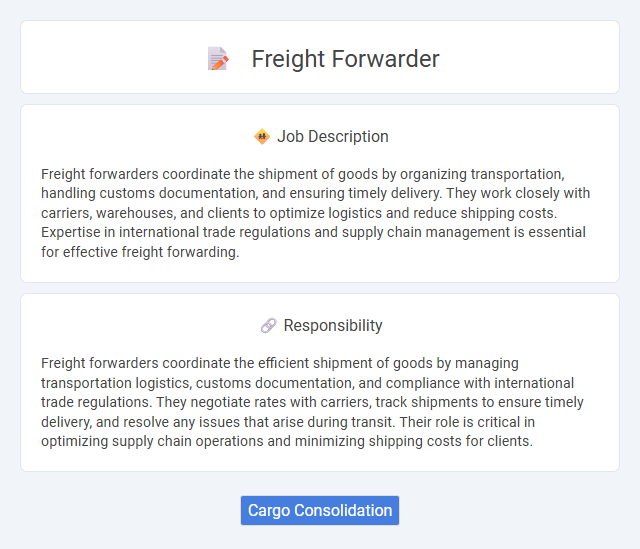
Freight forwarders coordinate the shipment of goods by organizing transportation, handling customs documentation, and ensuring timely delivery. They work closely with carriers, warehouses, and clients to optimize logistics and reduce shipping costs. Expertise in international trade regulations and supply chain management is essential for effective freight forwarding.
Individuals who thrive in fast-paced, detail-oriented environments are likely suitable for a freight forwarder job, as the role demands strong organizational skills and problem-solving abilities. People with excellent communication and negotiation skills probably find success managing logistics and coordinating between multiple stakeholders. Those who handle stress well and adapt quickly to changing situations may be better suited for the dynamic nature of freight forwarding.
Qualification
Freight forwarder job qualifications typically include a strong understanding of logistics, supply chain management, and international trade regulations. Proficiency in transportation documentation, customs compliance, and freight negotiation is essential for efficient shipment coordination. Candidates often require excellent communication skills, attention to detail, and experience with freight management software to optimize routing and cost control.
Responsibility
Freight forwarders coordinate the efficient shipment of goods by managing transportation logistics, customs documentation, and compliance with international trade regulations. They negotiate rates with carriers, track shipments to ensure timely delivery, and resolve any issues that arise during transit. Their role is critical in optimizing supply chain operations and minimizing shipping costs for clients.
Benefit
A freight forwarder job likely offers significant benefits such as enhanced expertise in global logistics, which can lead to improved career opportunities and higher earning potential. The role may provide exposure to diverse transportation modes, increasing skill versatility and marketability. Working in this position might also grant access to extensive professional networks and industry insights, potentially boosting long-term job stability.
Challenge
Freight forwarder jobs probably involve navigating complex logistics and regulatory requirements, which can present ongoing challenges. Managing unpredictable delays and coordinating among carriers, customs agents, and clients might frequently test organizational and problem-solving skills. These roles likely require adaptability and strong communication to effectively handle disruptions and ensure timely shipment deliveries.
Career Advancement
Freight forwarders coordinate the efficient transportation of goods, managing logistics from origin to destination while complying with customs regulations and shipping documentation. Career advancement in this field often leads from entry-level coordinator roles to senior logistics manager or supply chain director positions, emphasizing expertise in international trade and multimodal transportation. Mastery of freight management software and strong negotiation skills with carriers significantly enhance opportunities for leadership and higher salary brackets.
Key Terms
Cargo Consolidation
Freight forwarders specialize in cargo consolidation by combining multiple smaller shipments into a single, cost-effective container load, enhancing shipping efficiency and reducing overall transportation costs. This process optimizes space utilization in containers, minimizes freight charges, and streamlines customs clearance through unified documentation. Effective cargo consolidation requires coordination with carriers, warehouses, and customs authorities to ensure timely delivery and compliance with international shipping regulations.
 kuljobs.com
kuljobs.com